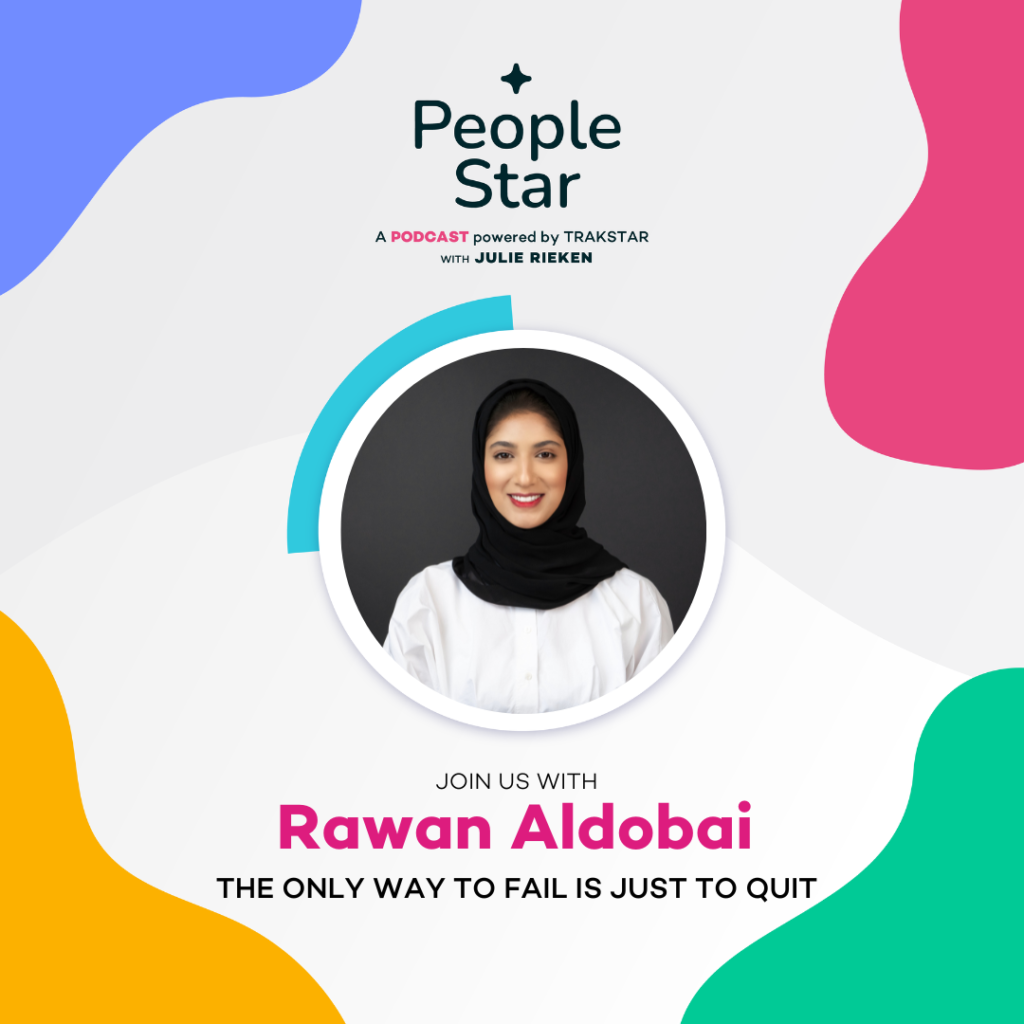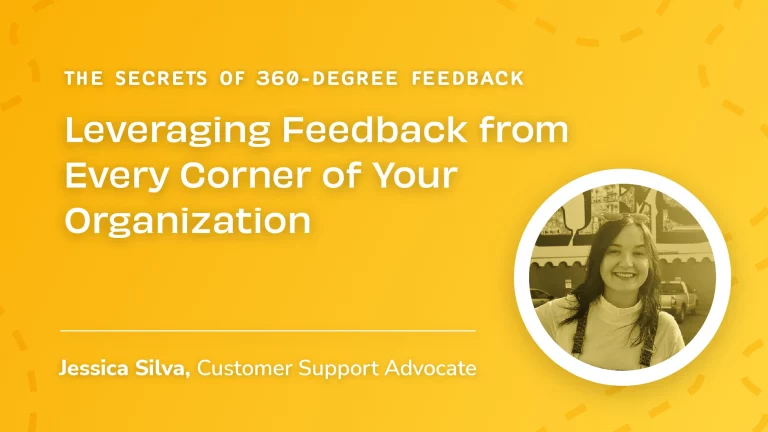PeopleStar_Rawan Aldobai: this mp3 audio file was automatically transcribed by Sonix with the best speech-to-text algorithms. This transcript may contain errors.
PeopleStar Intro/Outro:
Welcome to the PeopleStar Podcast. We deliver leadership perspectives from industry experts on their people, architecture, routines, and culture as they solve HR's newest challenges. And now your host, Julie Rieken.
Julie Rieken:
Good day podcast listeners, super excited today. I've got a really special guest and we've got a good topic today. We're going to talk with Rawan Aldobai. She has her own consulting company, and the story of how she got here is really fascinating and courageous. And maybe we're even having a theme on PeopleStar: courageous women. And so I'm so excited to talk to Rawan today because she has a story of how she made a difference in the world by doing something courageous and is now helping women as they build their careers in professional ways. And so I'm super excited to talk to Rawan about some different stories and thoughts on how we can help empower women in the workplace. Welcome, Rawan, I'm glad to have you here!
Rawan Aldobai:
Thank you, Julia. It's my pleasure.
Julie Rieken:
Rawan, When we were talking, one of the things that was so interesting to me was the story of why is helping women grow in their careers your passion. People have all kinds of passions. Why is this one yours? Can you tell us a little bit about your background and why? Why is this base resonating with you?
Rawan Aldobai:
Yeah, so I started in this journey back like, what, seven years ago when I was starting my career. And the thing that happened is I wondered and went in circles when I was trying to build that successful and fulfilling career. I always had that belief that your job, your career could be much more than just a paycheck, more than just going to work every day. And I tried different majors, I tried different career paths from dentistry to engineering to interior design, and I ended up in the financial industry somehow. I started that. I was like, okay, I like numbers, I love what, the stock market, and all of that, I love talking about money, so this would be a great career to get into. I spent a year or two years in the financial industry, I felt out of alignment, I was actually depressed for months because I was feeling like I was wasting my time and my life doing something that did not resonate with me. And it was so frustrating at the beginning because I felt there was a gap, there was something missing that I was not able to find, and I found out later that I always had that belief that everyone comes to this world with a certain calling and a purpose. And my purpose was to be someone who helped others, I always wanted to have an impact, I always wanted to help people get to where they want to go. And then I started working in the personal development space and I did not do that as an intention of starting a career there, it was just to help myself, and I actually found the secret of what brings success and fulfillment into our careers. And I, and then like a bulb lit up in my head and I was like, this is what I want to do, this actually is my calling, this is my purpose. It's not a passion, it's my purpose. I want to be that leader who will help other people bring success and fulfillment into their careers and their lives. Because I saw the huge impact that a career could bring to the rest of your life. How would that impact your health, your relationships, your finances and everything that you would do? So I made it my, my mission, my life mission and my purpose to help more women live more successful and fulfilling lives on purpose with their careers.
Julie Rieken:
That is fascinating and there's so many interesting parts to it. But one of the things that really strikes me is the moment of courage that you had from not only exploring different pathways but to being in finance and then one day saying, wait, no, because I think so many of us are faced with these inflection points where we choose to stay with that finance job because we're, because it's predictable, and it's good enough.
Rawan Aldobai:
Yeah.
Julie Rieken:
Or we can take a new path that's unknown. And that inflection point is one that I've grappled with and I've often picked the safer path.
Rawan Aldobai:
Yeah.
Julie Rieken:
I think we can all resonate with knowing what that feels like. So the people that actually take the other path are anomalies like you, and that's a really courageous move.
Rawan Aldobai:
It was scary, it was so scary. And I fought with it for months, not even, if not years, because I kept on ignoring the voice inside my head that was telling me this is not what you want to do. And I was like, no, it's good enough, it's good money, it's successful, it has good reputation, it's predictable. As you said, I have a successful career, why would I go do something that is unknown and certain? But it came to the moment of it's either living my life in a miserable way, it's not that it was bad, but I knew that at the end of like, when years passed by, I would regret not trying, not giving it a try. So it's like it's either now or never, that's why I dropped everything. I left my job without even a plan, I didn't have that much savings or any of that because I was like, okay, I'm doing this. And I told no one when I did that because I knew people around me would say you're out of your mind, and that would scare me. I was like, okay, I'm doing this, I'm giving it a try, and I'm so glad that I did that because now that I have the chance, the opportunity to help others do the same thing, live more purposeful and fulfilling lives and careers, it's it's worth it.
Julie Rieken:
I love that. So I've got a couple of questions for you about how you help women. Lets, things have changed for women in the workplace in the last couple of years. What do women want today? What are you seeing? What do they want?
Rawan Aldobai:
I am realizing that women these days are opening their eyes to the possibilities that they have. In the past, women, yeah, they wanted jobs, they wanted to have some career success and fulfillment, but they they didn't know that there was so much more that's possible for them. Now, I'm seeing a wave of change with that. I'm seeing women being more open to being leaders, they are more interested in making changes in organizations, they're aiming for more. They're not afraid to say I have what it takes to be a leader, I have what it takes to earn more money, I am a person who could bring impact. They're not shying away from it as they used to do before.
Julie Rieken:
I love that, I'm seeing, I mean, well, you're a great example of that. Look at the courage that you had, and women are now leaning into it, I love it. I want to think a little bit about how leaders like, people like me in leadership roles, how do we help women advance in the way that you're helping women? How should I, what advice do you have for me and for other people that are listening, HR Leaders, how should we think about helping women in today's world?
Rawan Aldobai:
The first thing that I would say is that there should be an emphasis on collaboration versus competition. Because what's, the idea been all those years that if someone, if a woman wants to advance, then that she's competing with other women and she's competing with men in organizations and the workforce and that idea should be changed because honestly, if you're going to be in a leadership position, if you know that you have the abilities to care for, the organization to make changes, that should be something celebrated. And the opportunities that would be given is showing that if you are a woman who wants to advance, to make a change, to grow in this space, you should be helped and guided rather than being shamed for what you want to do and just realizing that there's an opportunity for growth for everyone and that we actually grow and things change and things become better when we're all holding hands and going to that end goal because everybody wants different things, but they all want something that would blend with the other person to get to the end goal, which is making change and making things better. And that's how change happens rather than everyone trying to pull the other person down. So yeah, the first thing that I would always say is emphasize the idea of collaboration versus competition. There is room for growth for everyone.
Julie Rieken:
I love that. Just that mental shift is really important for leaders to take into account.
Rawan Aldobai:
Yeah.
Julie Rieken:
One of the things that we that we talked about, I think another mental shift is, well, the two things, maybe we can combine a couple of things here. Women pursuing their dreams more than they have before, having the courage to do it. And you have a story about why it's important for us to have this courage, and it's a story about gold. And I was hoping that you would share that because it really resonated with me about how, how should we think about advancing ourselves and why is it important?
Rawan Aldobai:
Yeah. So the story that I always love sharing, it's called Three Feet Away from Gold. And this story was told in the famous book Think and Grow Rich by Napoleon Hill. And it's a story about a young man who was mining for gold for months, and then he decided to quit because he was not seeing any gold. He sold all of his equipment to a dunk man who then got counsel before he started digging just to find that the gold would be found three feet away from where the previous man stopped mining. And I love the story, and I use it as an analogy to want to remind myself and anyone I work with to never quit. And this is something that every leader should remember because the road to success is bumpy and it might take you longer than expected. To get to where you want to go, but you should never quit or give up on your dreams and your goals because you never know when would that moment scale up. because the road to success is not a straight line, it's not linear. There are going to be lows and highs, and the only way to fail is just to quit, there is no failures. If you keep on going, you're not going to fail, you're going to succeed. That's guaranteed, that's something that's like a law, just like the law of gravity. You only fail if you quit and if you stopped fighting for your dreams and your your purpose and your goals.
Julie Rieken:
I love that there's so many things to think about there. I think about the gold being three feet away and not quitting and being a runner. One thing I know is don't quit. You have the finish line, just keep going. But the road there can be bumpy, so this is a great analogy. I love it. Rawan, we have a list of questions that we think about with People Star, and you picked a really unusual one, one that I've never had anybody pick. I want to, I want you to expand on it. And the question is, it's in the culture section of our podcast, and the question is, do you have any interesting symbols, myths or stories that you share in your organization? And you had an interesting symbol, and I just want, I'd like for you to share with, with our listeners what is your symbol and why does it matter?
Rawan Aldobai:
The interesting symbol that I always share and I always had it in me, but I never thought why I loved it so much until like, I really think, like, thought about this question and it's the Phoenix bird. Now, there are many different beliefs and thoughts about the Phoenix, but to me it's a reminder that every end could be a beginning of a new and beautiful chapter, I also see it as a symbol of strength and hope. I believe that the whole idea of the rebirth from ashes, it's just a representation of what comes after any adversity. And that is exactly what every successful journey looks like. You face challenges and adversity that will help you grow and shine. And it's like, I keep on reminding myself of this simple, every time I hit like a wall and I feel stuck and I'm like, okay, this time I'm burning down to ashes, but I know I'm going to grow better, stronger and even more beautiful than I used to be. So I always love to share that simple and have it in my head just to remind me that beauty, growth and shining comes after being burned down.
Julie Rieken:
I love that. Y'all, Rawan Aldobai. Rowan, it's been such a pleasure to talk to you about how to help women grow, how your own story has transformed you, and how you are using a lot of those lessons to help women grow in today's world. And I think it's not an old topic. It's a, it's a current topic, it's one that I think about, it's one that you're thinking about. And I hope a lot of our HR leaders are thinking about how to empower women in their organizations, so thank you for being a guest today.
Rawan Aldobai:
Thank you for having me. This was very exciting and interesting session.
PeopleStar Intro/Outro:
Thanks for listening to the PeopleStar Podcast. For the show notes, transcript, resources, and more ways to get a seat at the table, visit us at TrakStar.com/Podcast.
Sonix has many features that you’d love including powerful integrations and APIs, enterprise-grade admin tools, automatic transcription software, collaboration tools, and easily transcribe your Zoom meetings. Try Sonix for free today.




